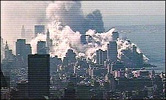PTSD High Among Witnesses to 9/11
One in 8 NYC residents near scene affected years later, with those injured suffering most.
|
E-mail this article
Subscribe to news
Printer friendly version
|

(SOURCE: New York City Health Department, news release, June 13, 2008)
FRIDAY, June 13 (HealthDay News) -- Two to three years after the World Trade Center terrorist attacks, one in eight residents who lived near the site had signs of post-traumatic stress disorder (PTSD), a New York City Health Department study reports.
This rate, 12.6 percent, among Lower Manhattan residents is three times the usual rate and matches the 12.4 percent rate reported among rescue and recovery workers. Residents who were injured during the attacks had the highest rate of PTSD symptoms (38 percent), followed by those who witnessed violent deaths and those caught in the dust cloud after the towers collapsed on Sept. 11, 2001.
The most commonly reported PTSD symptoms were hyper-vigilance, nightmares and emotional reactions to reminders of 9/11.
The study, based on surveys of 11,000 residents through the World Trade Center Health Registry, also found that divorced people reported PTSD symptoms at twice the rate of married people (21.5 percent vs. 9.5 percent), possibly because divorced people received less emotional support, the researchers suggested.
Women were affected at a higher rate than men (15 percent vs. 10 percent), Hispanics (24.7 percent) and blacks (20.6 percent) were affected more than whites (10.7 percent) and Asians (8.9 percent), people with less than a high school diploma (18.3 percent) were affected more than college graduates (11.1 percent), and those who earn less than $25,000 a year (19.8 percent) were affected more than those who earn $50,000 to $74,999 (11.3 percent).
"These findings confirm that the experience of 9/11 had lasting consequences for many of those affected by it," Dr. Thomas Frieden, New York City Health Commissioner, said in a prepared statement.
The study, the first to measure the WTC attacks on the mental health of residents, was published online this week in the Journal of Traumatic Stress.
More information
The U.S. National Institute of Mental Health has more about PTSD.
Copyright © 2008 ScoutNews, LLC. All rights reserved. 
HealthDayNews articles are derived from various sources and do not reflect federal policy. healthfinder.gov does not endorse opinions, products, or services that may appear in news stories. For more information on health topics in the news, visit the healthfinder.gov health library.